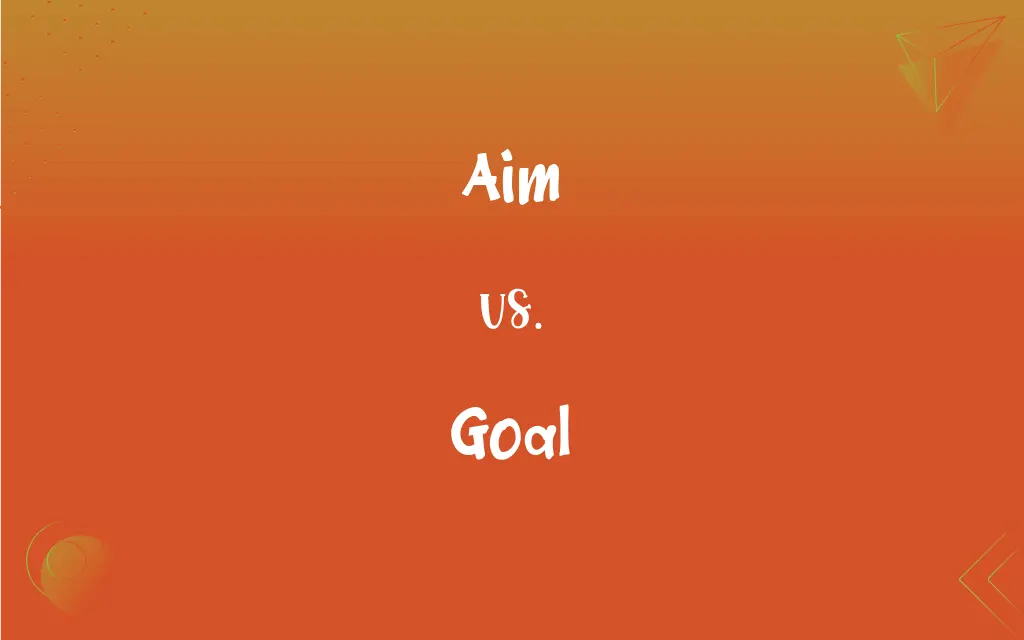Aim vs. Goal: What's the Difference?
Edited by Aimie Carlson || By Harlon Moss || Updated on October 9, 2023
An aim is a general direction or intention, while a goal is a specific and measurable target or endpoint.

Key Differences
Aim refers to the intention or direction in which one moves, or in which one desires to move, emphasizing directionality and a path of motion toward a target. Contrarily, a goal usually signifies a more specific, clearly defined endpoint or a condition that one intends to realize, usually connoting a certain level of achievement or fulfillment. While an aim provides a direction, a general sense of moving towards a desired state, a goal establishes a defined target, a clear point of achievement to be reached. The distinction becomes apparent when considering that one’s aim might lean toward a broader, perhaps more abstract ambition, whereas a goal inherently suggests a tangible, quantifiable outcome that one seeks to achieve.
Exploring these concepts in an educational setting, an individual might have the aim to become more knowledgeable in a certain field, which embodies a general direction toward accruing knowledge and expertise. The goals within this context might include obtaining a degree or certification, presenting clear, achievable milestones that mark progress within the broader aim. Thus, goals often serve as markers, signifying specific achievements within the larger trajectory established by an aim. In this vein, goals can be viewed as steps or milestones that guide and measure one’s journey toward fulfilling a broader aim, signifying concrete points of achievement within the larger, perhaps more abstract, journey.
Conversely, when contemplating career aspirations, an individual might aim for success in a particular industry, indicating a general desire and direction without specifying the markers of that success. Within this overarching aim, specific goals might include landing a particular job, achieving a certain salary, or securing a specific client, which offers measurable, defined objectives that, when achieved, signify progress toward the larger aim. The aim thus sets the general directional course, while goals act as definable, achievable objectives that provide structure and measurability within the broader path defined by the aim.
If one were to delve into the realms of personal development, an aim might be to lead a healthier life, indicating a broader, ongoing ambition without a clearly defined endpoint. Within this context, goals such as losing a certain amount of weight, running a specific distance, or achieving a particular fitness milestone provide clarity and measurability, serving as indicators of progress within the larger aim. Therefore, while an aim might lack a clear ending or quantifiable markers, goals introduce specificity, enabling one to gauge progress and achievement within the general trajectory established by an aim.
In a business context, a company might aim to become a leader in its industry, providing a general directional ambition without specifying the metrics of what leadership entails. Subsequently, specific goals might be set, such as achieving particular revenue milestones, securing a certain market share, or launching a specified number of products within a given timeframe, serving as measurable objectives that guide the company toward its broader aim. Consequently, while the aim serves to establish a general direction and ambition, goals introduce specific, quantifiable targets that guide actions and strategies, enabling the company to navigate its path toward realizing its larger aim.
ADVERTISEMENT
Comparison Chart
Definition
General intention or direction
Specific, measurable endpoint
Grammatical Use
Often verb (aim to do) and noun
Primarily noun
Temporality
May be long-term or indefinite
Generally has a set timeframe
Specificity
Broader, less specific
Concrete, detailed
Outcome Measurement
Less tangible, subjective
Measurable, tangible
ADVERTISEMENT
Aim and Goal Definitions
Aim
Aim is a desired result one strives for.
His main aim is to achieve personal growth.
Goal
Goal refers to the end toward which effort is directed.
She set a goal to read 50 books this year.
Aim
Aim refers to the direction in which something is pointed.
He took careful aim before releasing the arrow.
Goal
Goal can mean the endpoint of a process or activity.
The marathoner pushed hard to reach the finish goal.
Aim
Aim indicates a plan or ambition to achieve something.
Their primary aim was to raise awareness about the issue.
Goal
A goal is a specific target or desired outcome.
The team's goal was to win the championship.
Aim
Aim is the purpose or intention behind an action.
Her aim was to inspire the audience.
Goal
Goal is an objective or result one works to attain.
Reaching that sales goal was a significant achievement.
Aim
Aim can mean the act of pointing or directing towards a target.
With steady aim, she threw the dart.
Goal
Goal denotes a clear, often measurable, endpoint in planning.
Setting clear goals is crucial for project success.
Aim
To direct (a weapon or camera) toward a point.
Goal
The object toward which an endeavor is directed; an end.
Aim
To direct or propel (an object, such as a ball) toward a point
Aimed the pass at a wide receiver.
Aimed the shot at the lower right corner of the goal.
Aim
To direct toward or intend for a particular goal or group
The publicity campaign was aimed at improving the eating habits of children.
FAQs
Why is setting a goal important?
Setting a goal provides clarity, motivation, and a measure for success.
Can an aim be a goal?
An aim can be broad and lead to specific goals within its scope.
Can aims and goals change over time?
Yes, both can evolve based on experiences, learning, and changing circumstances.
Can a goal exist without an aim?
While possible, a goal without an underlying aim might lack purpose or context.
What's the relation between aims and objectives?
Objectives are specific steps or milestones towards achieving an aim.
What is an aim?
An aim is a general intention or direction one wishes to pursue.
What is a goal?
A goal is a specific, measurable target or endpoint.
Is it necessary to have an aim before setting a goal?
Ideally, yes, as an aim provides the direction, while goals offer specifics.
How specific should a goal be?
Goals should be specific enough to be measurable and achievable within a set timeframe.
How does one prioritize multiple goals under an aim?
By evaluating each goal's importance, urgency, and alignment with the aim.
What's the difference between a goal and a target?
A target is often a quantifiable measure within a goal, while a goal might encompass broader outcomes.
Should one be flexible with their aims and goals?
Flexibility allows adaptation to changing situations while staying aligned with one's core intentions.
Can a goal be too ambitious?
Yes, overly ambitious goals might be unattainable, leading to demotivation.
How do you set a realistic goal?
By evaluating current resources, constraints, and aligning with achievable steps toward the aim.
How do you measure the success of a goal?
Success is measured by the tangible achievement of the set goal's criteria.
Why is an aim sometimes vague?
An aim is broader, setting the direction or vision without detailing every step.
How often should one review their goals?
Regularly, to ensure they remain relevant and to track progress.
Can a project have multiple aims and goals?
Yes, a project can have various aims and specific goals under each aim.
Does every aim need a goal?
Not necessarily, but goals help operationalize and achieve the broader aim.
Is an aim always long-term?
No, an aim can be short-term or long-term, but it's generally broader than a goal.
About Author
Written by
Harlon MossHarlon is a seasoned quality moderator and accomplished content writer for Difference Wiki. An alumnus of the prestigious University of California, he earned his degree in Computer Science. Leveraging his academic background, Harlon brings a meticulous and informed perspective to his work, ensuring content accuracy and excellence.
Edited by
Aimie CarlsonAimie Carlson, holding a master's degree in English literature, is a fervent English language enthusiast. She lends her writing talents to Difference Wiki, a prominent website that specializes in comparisons, offering readers insightful analyses that both captivate and inform.































































